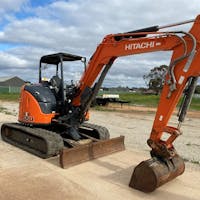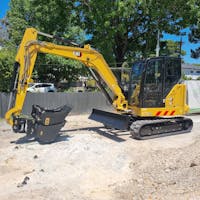Find the Best 70 Tonne Excavators Near You
- Post a job
- Receive multiple quotes
- Choose your preferred 70 Tonne Excavator suppliers
Where do you need 70 Tonne Excavator Hire?
Describe your job and our suppliers will send you quotes
Popular 70 Tonne Excavator Hire Locations
2,800+ 70 Tonne Excavators for Hire on iseekplant
At iseekplant, we pride ourselves on our extensive directory of over 2,800 70 tonne excavators, sourced from reputable suppliers across Australia. These mammoth machines are engineered for the most demanding tasks in large-scale construction, mining and other industrial projects.
With such a vast range of options, you're guaranteed to find the ideal 70 tonne excavator that matches the specific requirements of your job. In this guide, we highlight the 70 tonne excavator. We cover the standard hire rates, specifications of popular 70 tonne excavator brands, essential attachments and safety and operational guidelines.
70 Tonne Excavator Hire Rates Guide
The hire rates for 70 tonne excavators usually depend on various factors, including location, hire duration and the specific model of the excavator. On average, the dry hire rates range from $2,000 to $2,500 per day. On the other hand, wet hire rates may vary between $3,500 and $4,000 per day. Below is a table showing indicative hire rates of different 70 tonne excavator types:
| Excavator Type | Average Dry Hire Rate (per day) | Average Wet Hire Rate (per day) |
|---|---|---|
| Standard | $2,100 - $2,600 | $3,600 - $4,100 |
| Long Reach | $2,200 - $2,700 | $3,700 - $4,200 |
| GPS Enabled | $2,300 - $2,800 | $3,800 - $4,300 |
Note: Rates are estimates and subject to change. All prices listed are estimates, exclude GST and are in AUD.
Additional Costs to Consider When Hiring a 70 Tonne Excavator
Beyond the base hire rates, there are additional costs you should factor into your budgeting:
| Additional Cost | Estimated Cost | Description |
|---|---|---|
| Transport and Delivery | $500 - $1,000 | Cost varies with distance to the site |
| Fuel Consumption | Based on usage | Depends on operational hours |
| Attachments (beyond standard) | $100 - $300/day | Cost for specific tasks like rock breaking |
| Damage Waiver | 5% - 10% of hire rate | Optional insurance against damage |
| Operator Training | $200 - $500 | Training costs for operators |
| Environmental Compliance | $100 - $400 | Costs for ensuring environmental safety |
| Extended Warranty | Percentage of hire rate | For additional coverage on equipment |
| Site Preparation | $500 - $2,000 | Preparing the site for excavator use |
| Standby Charges | $100 - $300/day | Fees for keeping the excavator on standby |
| Emergency Support | $150 - $500 | Immediate assistance for unexpected issues |
| Cleaning and Maintenance | $200 - $600 | Post-hire cleaning and maintenance |
Remember, these additional costs are estimates and can vary by provider. To get a precise quote tailored to your project, use our Get a Quote tool to connect you directly with our suppliers today!
Sizes, Specs and Capacities of Popular 70 Tonne Excavators
70 tonne excavators represent a substantial leap in power and capability in the excavator world. Their robust build and advanced technology make them ideal for large-scale construction and mining operations.
Featuring high-performance engines and deep digging depths, these machines offer exceptional efficiency and durability. Here, we explore the leading brands and why they stand out.
- Caterpillar: Known for its robust construction and reliability, Caterpillar excavators are a staple in heavy construction due to their unmatched durability and advanced technology.
- Komatsu: Komatsu excels in integrating innovative technologies with powerful performance, making their excavators highly efficient and operator-friendly.
- Hitachi: Renowned for their advanced hydraulic systems and fuel efficiency, Hitachi's excavators are preferred for high-precision tasks and long-term durability.
- Volvo: Volvo excavators are recognised for their environmental friendliness and superior fuel efficiency, offering significant operational cost savings.
- Liebherr: Liebherr's commitment to precision engineering is evident in their excavators, known for high-end performance and exceptional control systems.
This table shows each brand’s popular models, their quick specs and pros and cons:
| Brands/Models | Quick Specs | Pros | Cons |
|---|---|---|---|
| Caterpillar 336 | Weight: 37t Power: 273 kW, Dig Depth: 8.3m, Bucket: 2.5 m³ | High efficiency, Reliable, User-friendly design | Higher initial cost, Can be costly to maintain |
| Komatsu PC700LC-8 | Weight: 67.5t, Power: 323 kW, Dig Depth: 7.5m, Bucket: 3.4 m³ | Powerful engine, Durable build, Good resale value | Requires skilled operation, Heavier fuel consumption |
| Hitachi ZX670LCH-5B | Weight: 69t, Power: 348 kW, Dig Depth: 7.7m, Bucket: 3.2 m³ | Advanced hydraulics, Efficient fuel use | Limited availability, Parts can be expensive |
| Volvo EC750E | Weight: 73.5t, Power: 385 kW, Dig Depth: 7.38m, Bucket: 3.3 m³ | Fuel-efficient, Low emissions, Comfortable cabin | Heavier weight, Higher upfront cost |
| Liebherr R 976 | Weight: 76.5t, Power: 400 kW, Dig Depth: 7.8m, Bucket: 4.0 m³ | Precision control, Robust design, High capacity | Higher maintenance costs, Larger physical footprint |
Technological advancements in 70 tonne excavators, such as improved hydraulic systems, fuel-efficient engines and digital monitoring, optimise their performance in challenging environments. These machines are not just about raw power; they represent the pinnacle of engineering excellence in heavy machinery.
Essential Attachments for 70 Tonne Excavators
70 tonne excavators, given their large size and power, can be equipped with various attachments to enhance their efficiency and versatility on various projects. Understanding which attachments are essential can significantly impact the productivity of these machines.
- Rock Breakers: Ideal for demolition, quarry work and breaking up large boulders. Rock breakers turn the excavator into a powerful demolition machine.
- Buckets (various types): Standard digging buckets are crucial, but specialised ones like mud buckets or trenching buckets expand the excavator's utility in different soil conditions.
- Rippers: Perfect for penetrating tough surfaces like frozen ground or rocky terrain, rippers are essential for initial ground breaking.
- Compaction Wheels: For tasks involving soil compaction in trenches or construction sites, compaction wheels attached to a 70 tonne excavator ensure deep compaction.
- Grapples: Useful in logging, demolition and recycling, grapples allow for precise handling and movement of various materials.
This table covers which attachments are best suited for particular tasks to help your decision-making process when hiring a 70 tonne excavator:
| Job Site Need | Suggested Attachment | Utility |
|---|---|---|
| Demolition | Rock Breaker | Breaks up concrete, asphalt and rock in demolition projects |
| General Excavation | Standard Digging Bucket | Essential for earthmoving and digging operations |
| Handling Loose Material | Grapple | Facilitates the movement and loading of logs, debris, etc. |
| Ground Breaking | Ripper | Ideal for penetrating hard or frozen surfaces |
| Trench Compaction | Compaction Wheel | Ensures efficient soil compaction in trenches and other areas |
Safety and Operational Guidelines of 70 Tonne Excavators
When operating 70 tonne excavators, safety is paramount. While incredibly efficient, these large machines require strict adherence to safety protocols to ensure the well-being of operators and site workers. Understanding and respecting the power of 70 tonne excavators is key to maintaining a safe work environment.
Specific Safety Protocols
These safety protocols ensure the safe operation of 70 tonne excavators:
- Personal Protective Equipment (PPE): Operators and all personnel on-site must wear appropriate PPE, including hard hats, high-visibility clothing, steel-toed boots and hearing protection.
- Pre-operation Checks: Conduct thorough inspections of the excavator before use, checking for any mechanical issues, ensuring all safety features are operational and verifying the stability of the terrain.
- Operational Safety Measures: Maintain clear communication with ground staff, adhere to load capacity limits and always be aware of your surroundings, particularly when manoeuvring or digging.
Operator Training and Certification
Operating a 70 tonne excavator requires specialised training and certification. Operators must be trained in handling heavy machinery, understand its capabilities and limitations and be familiar with Australian safety regulations for heavy equipment operation. Regular refresher courses are recommended to keep skills up-to-date.
Maintenance Guidelines
Regular maintenance is critical for the safe operation of a 70 tonne excavator. This includes the following steps:
- Checking hydraulic systems and fluid levels
- Inspecting tracks or wheels for wear and tear
- Ensuring that the cabin and controls are in good working condition
- Scheduling periodic professional inspections to identify and address potential issues before they lead to equipment failure
Adhering to these guidelines helps in minimising risks associated with operating heavy machinery and contributes to a safer construction or mining site.
Elevate Your Project with the Right Heavy Machinery
In large-scale construction and excavation, the 70-tonne excavator stands as a titan. At iseekplant, we also offer a comprehensive range of heavy machinery to complement your project needs. We have everything from powerful graders for precise levelling, rugged dozers for rough terrain, and efficient trenchers for accurate digging.
Pair your excavator hire with dump trucks for hassle-free debris management. Our extensive network ensures you find the ideal machinery for any task. Need guidance or have queries? Contact us at projects@iseekplant.com.au or call 1300 691 912. Ready to boost your project's efficiency? Click 'Get a Quote' for the best machinery hire solutions.
Become a supplier
Recent 70 Tonne Excavator Hire reviews
"We have hired equipment from C&L Worx and experienced a personal but still professional business transaction conveyed in a timely manner. We have also..."
- Stephen and Robyn PeekView profile"Very professional team. Did a full warehouse demolition for us, followed by excavation work. It's always a pleasure to work with Paul, he is always an..."
- John CarloView profile"I highly recommend Jared for any civil job you may have. He is professional, knowledgeable and reliable. I engaged with him for a retaining wall job i..."
- PhilView profileHow It Works
70 Tonne Excavator Hire FAQs
Here are some frequently asked questions and tips on finding the right 70 tonne excavator supplier for your job.
What do we have to offer?
Want to Know More?
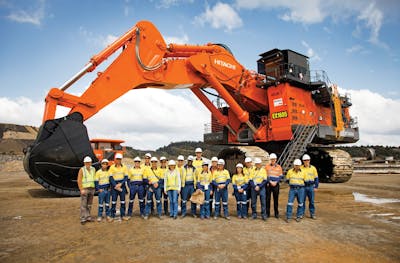
Top 20 World’s Biggest Excavators - 2022 Edition
Excavators are versatile, heavy machines deployed to move large obje...
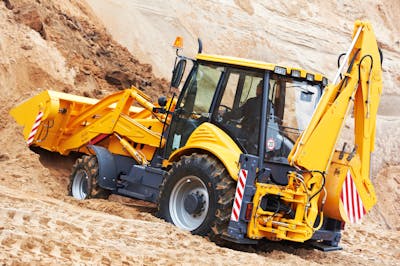
Excavator Vs Backhoe: Which Machine Is Best For Your Project?
Got an excavating project? Wondering what the difference is between an ...
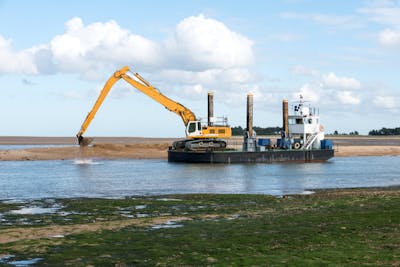
Excavator Types: Which is Right for You?
Excavators are a staple on construction sites but with there being so ma...
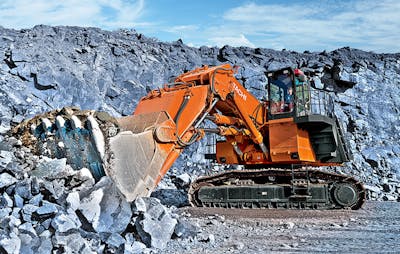
Excavator Licence Guide 2022 | iseekplant
Congratulations on your decision to join the best industry on earth, con...
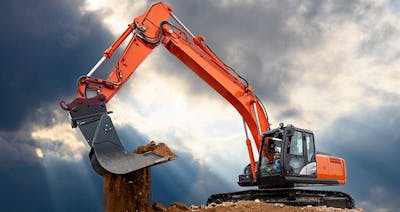
Top 10 Excavator Brands in Australia
What are the best excavator brands available in Australia? When it come...
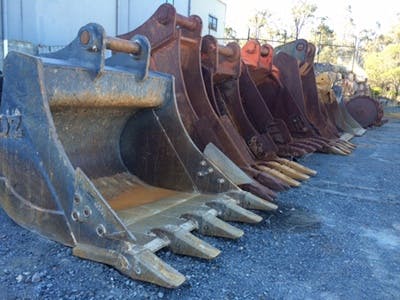
Common Digger & Excavator Attachments
Once you have chosen the right excavator for your job, you often need ex...
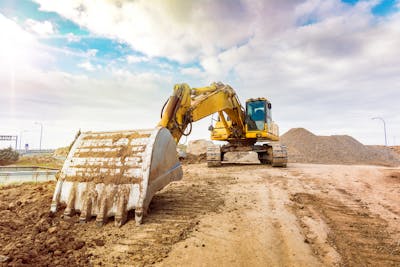
Top 5 Best Excavator Attachment Manufacturers in Australia
Excavators are one of the most commonly used machines on Australian work...
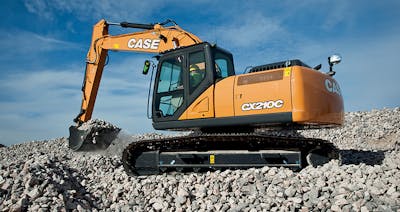
Excavator Operator Licence & Ticket Guide
It's difficult to beat the effectiveness of an excavator with their myri...

